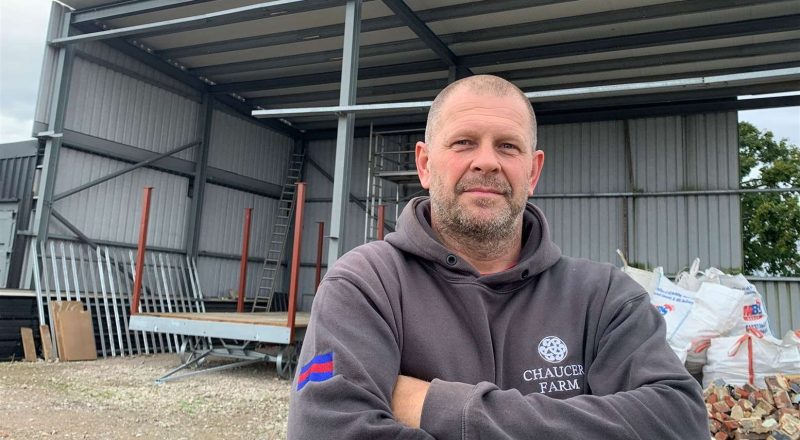A defiant ex-farmer says he will tell the council to “p*** off” if it tries to shut his new business down over a planning row.
Stephen Cook, 53, says a “devastating” increase in costs during the pandemic forced him to ditch animal rearing and transform his farm in Sturry, Kent, into a storing and servicing enterprise for heavy machinery.
However, his ventures face being blocked as he only asked to change the use of the site from “agricultural” to “industrial” retrospectively – and Canterbury City Council (CCC) rejected his application.
This decision has since been upheld by the Planning Inspectorate – meaning Mr Cook could face enforcement action if he continues trading.
Despite this, the defiant ex-farmer has vowed to keep his business running – claiming he will tell bosses to “p*** off” if they attempt to close him down.
Mr Cook said: “I bought the farm in 2005 and originally we had a pig enterprise where we bred pigs, sold them to the market, or used them for sausages and meats.
“Covid and the war in Ukraine came and sort of knocked us off our feet with the price of animal food.
“Soya, the main ingredient of the food, nearly doubled from about £250 a tonne to £450, and it wasn’t sustainable to keep the business going.
“So, I tried to diversify by going into machine storage and repairs.”
Mr Cook started using buildings on Chaucer Farm – something which required a planning application for a ‘change of use’ from agricultural to industrial or commercial.
He retrospectively made this application in October last year but it was rejected by CCC, who said the development would result in general industrial units on land not allocated for business use.
The inspector said: “The Local Plan allocated sites for business use within the district in order to meet the district’s development needs during the plan period.
“The appeal site is not allocated for such uses. The site lies outside of any settlement boundary and therefore falls within the countryside for planning purposes.
“While the proposal would support economic growth and double the number of employees on-site, I do not find that these factors outweigh the harm caused by the unsuitable location of the development and the conflict I have identified with the development plan.”
Mr Cook has questioned this ruling however – claiming that the farm is neighboured by businesses with commercial usage rights.
He said: “We’re not rural at all.
“There’s stacks of development going on all around us.
“There’s commercial permission right next door to me and on the other side for another company.
“In ancient woodland, 500 metres away, there’s a traveller camp with mobile homes.”
Since the rejection by the Planning Inspectorate, Mr Cook has launched another appeal.
He added that he will keep his business running – even if it is unlawful – and said he will go to court with the council if he has to.
He said: “No doubt they’ll try and land on me for some sort of offence in breaking planning laws, because that’s what they do.
“If they were to tell me I can’t run my business here, I would tell them to p*** off.
“I’ll keep running the business and if they want to go to court, I’ll go to court with them.”
When approached for comment by the Sun, a CCC spokesperson said: “This planning application was refused in October 2023 on the grounds that the proposal was contrary to a number of Local Plan policies.
“In particular, the proposed development would have resulted in general industrial units outside of any employment site allocated for such uses, without any justification for the need of the development in this location.
“The applicant had also failed to adequately demonstrate that the development would not have any unacceptable effect on the safe movement of pedestrians and other vehicles in and around the site given the absence of plans demonstrating parking provision, layout or access road details.
“Naturally we are pleased that the independent planning inspector agreed and dismissed the applicant’s appeal.”
The Planning Inspectorate says it cannot comment on the case as the appeal decision could still be challenged in the High Court if it is believed a legal mistake has been made.
What are the laws on retrospective planning applications?
Planning can be confusing – so what exactly does the law say when it comes to retrospective planning applications?
- If you’ve built or renovated a property without planning permission, you may be visited by planning enforcement officers to inspect the works
- They’ll decide whether a planning breach has potentially taken place
- If they decide that planning permission was required, the local authority will request that you submit a retrospective planning application
- You, as the owner or occupier of the land, will then be expected to apply for permission for the changes already made to the property
- The local authority may accept or reject the application
- If it is rejected, you will be issued with an enforcement notice
- You can then make an appeal to the Planning Inspectorate against your enforcement notice
- However, if the decision is upheld, you are required to make the requested changes – for example, demolishing a new building
- If you fail to do so, you may be prosecuted and receive penalties such as a fine
- The council can also get a court order to demolish the building itself



